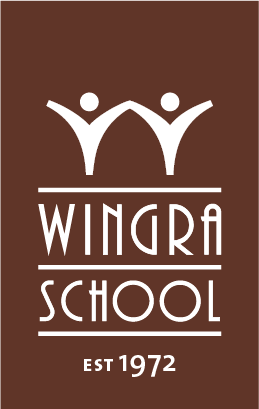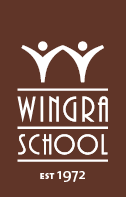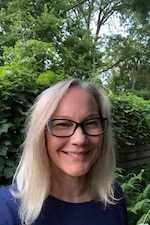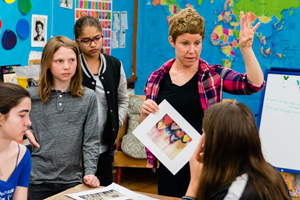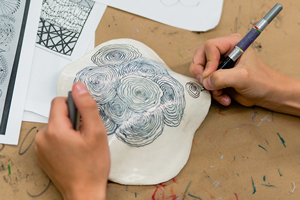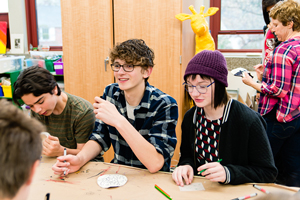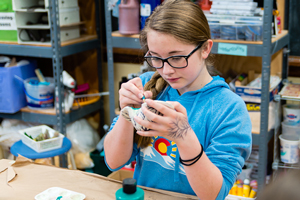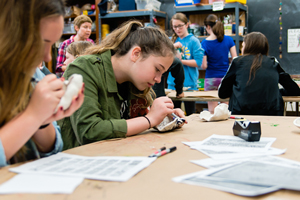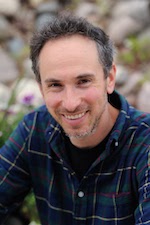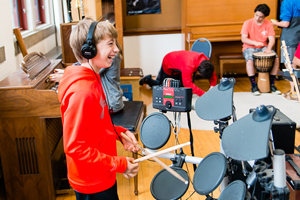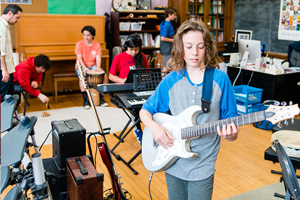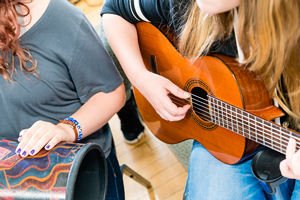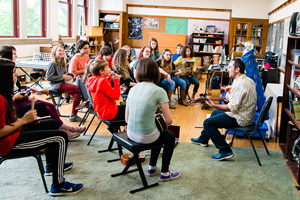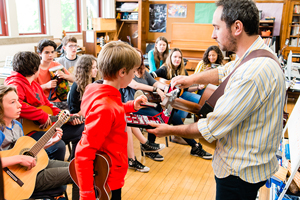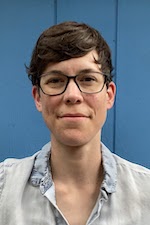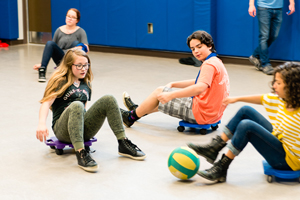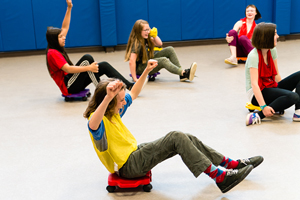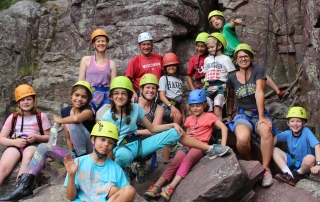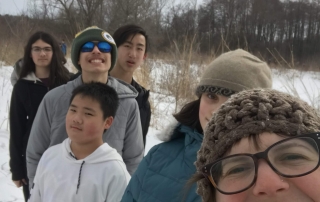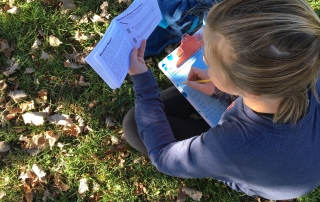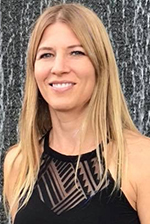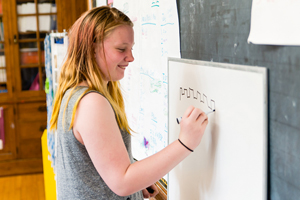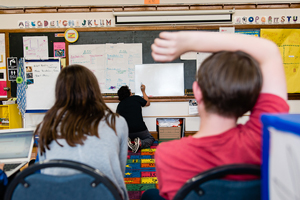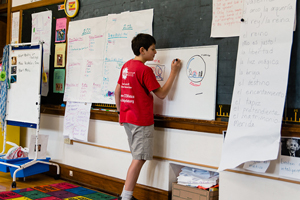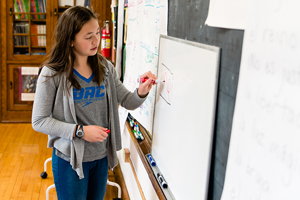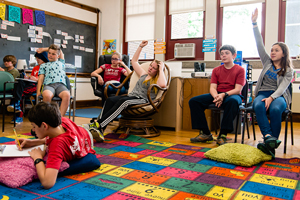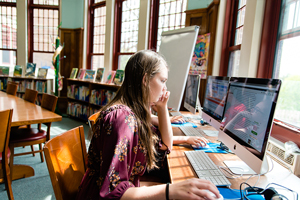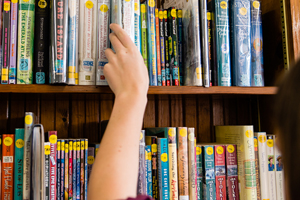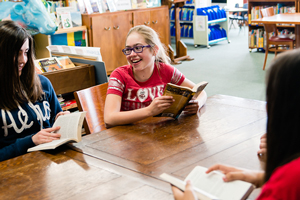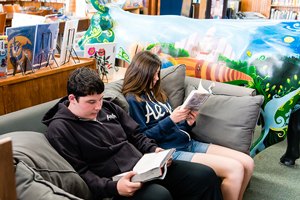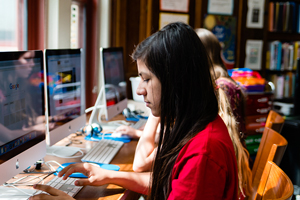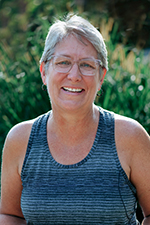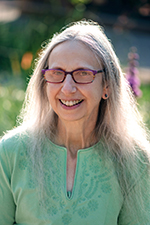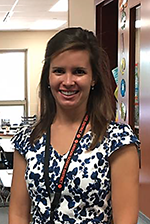The Sky (Ages 11-14)
The Sky is our three-year mixed-age program for 11 through 14 year-olds (equivalent to 6th, 7th, and 8th grade). The primary goal of Wingra’s Sky program is to provide an environment that supports adolescent growth and learning in an integrated manner, promoting self-understanding, skill development, and the desire to continue learning.
They need to experience the intrinsic value of intellectual pursuits.
We believe adolescents need to be cared for, loved, and respected. They need to be known and valued as unique individuals and develop a positive understanding of self in relation to community. They need to feel physically and emotionally safe in order to take risks. They also need to maintain a healthy sense of curiosity, explore a wide range of subject areas, and experience the self-confidence that accompanies mastery of new skills. They need to develop an appreciation for the power and beauty of an idea and to experience the intrinsic value of intellectual pursuits. They need to develop a comprehensive understanding of themselves as learners and have many opportunities and avenues for self-expression by sharing their talents and skills with others. They need to work within structure and well-defined limits and to learn skills in self-management by experiencing failure and success in a supportive and responsive environment.
We could not have asked for a more optimal, holistic, and inspiring school experience. You have inspired us as parents, and we’re deeply grateful for your attentiveness, wise understanding, and compassion for all of the students. – Lisa, former Wingra parent
Our Approach
LITERACY
What counts as literacy? Literacy cannot be limited to the mastering of specific reading and writing skills. We want to generate knowledge from our experiences and those experiences include more than print texts. As texts and media evolve, so does our understanding of what it means to teach literacy. The dynamic nature of technology, language, stories, media, and communication, creates a varied experience for every student in the Sky. Each student brings a different relationship to writing, and values the process in their own inimitable way.
Our goal is for students to feel comfortable in the writing process, working at drafts with others’ input, to come to a finished piece that best reflects their purpose and ideals. Students appreciate that different writing structures can be used to learn about and respond to the world around them. A poem, song lyrics, a performance piece, or letter to the editor is just as valuable as a five paragraph essay. Students practice identifying ways that they best critically take information in and, separately, determine how they best demonstrate what they know.
We want students to be engaged participants in a democracy, and strive to build a culture of respectful speaking and listening. Students learn to speak with an understanding of how they are received, listen with patience, and read all literature with a critical eye towards the big picture. Reading and writing are skills specifically valued by dominant culture. We value them as well, and, we want students to develop a greater breadth of skills to read and write the world.
MATH
We believe development in all areas of mathematics supports increased conceptual understanding. Each year in the Sky, we provide a program of broad experiences rather than narrowing a student’s practice to one aspect of math, such as algebra. Students continue to learn algebra, geometry, data and statistics, trigonometry, and number theory throughout each of their three years in the Sky.
During our structured math times, students cultivate an ability to balance playfulness with perseverance as they patiently apply multiple strategies to their problem solving. Being able to identify a reasonableness in an answer, make a model of a problem, or carefully articulate their thinking are hallmarks of a strong Wingra mathematician. Teachers intentionally guide students to be critical of real world data, helping them to identify bias or the misuse of data within a particular context. Perhaps most importantly, teachers work diligently to combat gender stereotypes, especially in math, science, and technology, which continue to exist in our culture. The overall mathematics program, which includes a combination of group and individual work, fosters higher level conceptual understanding with skill development and facility.
SCIENCE
The Sky’s constructivist approach to learning is scientific in nature. We start with where the students are in their understanding about particular phenomena and through collaborative investigation, sharing, and testing their ideas, develop a sound understanding of scientific concepts. The curriculum focuses on stewardship of the earth and its resources. Making sense of themselves and the world around them is ongoing. They learn to think and interact in the world like scientists. We consider the ethics of various applied scientific and technological concepts especially on marginalized populations and sensitive environments. We encourage a healthy skepticism while simultaneously finding value in knowledge for the sake of knowledge.
Students work collaboratively investigating, researching, experimenting, gathering data, researching other sources, organizing results, drawing conclusions, and asking further questions. We make space for failure and encourage safe risk-taking in intellectual processes.
The main objectives of our science program are to: 1) inspire a sense of wonder in our students so they will continue to investigate scientific questions on their own; 2) equip our students with the knowledge and the tools they need to research answers to scientific questions.
Sky students work with units related to physical science (chemistry and physics); biological and life sciences; and earth and space sciences. Much of the science is inquiry-based and problem-solving in nature. Embedded in students’ science learning are aspects of the history of science, the nature of science, and model-building explanations for natural phenomena. Teaching strategies include: readings from various sources (i.e. various textbooks, newspapers, journals, other student’s writing), labs, opportunities for tinkering, demonstrations and presentations by experts in the field, and visits to working laboratories. We frequently borrow materials from the university, visit science laboratories, and practice various lab techniques. Sky students maintain science notebooks which include detailed diagrams, data, summaries of experiences, and lab reports.
Our approach balances instruction and hand-on experiences; the curriculum is guided by students’ developmental ages and stages, Next Generation Science Standards, Wisconsin Model Academic Standards, and, most importantly, our progressive ideals.
SOCIAL STUDIES
Our overarching goal for our students is to become strong, healthy individuals that contribute positively to the various communities that we are a part of. Instead of just learning about the fundamental concepts of our democracy, we put them into practice daily. We recognize that we are political and social creatures and there is much to be learned about the broader world by examining the social interactions we are involved in at school. Students learn to be effective advocates for themselves and others by being encouraged to respectfully challenge authority, to raise issues that concern them, to facilitate classroom meetings, to take responsible and inclusive action in addressing issues, and to participate in co-creating and modifying curriculum.
We confront the tension between individual rights and what is the common good honestly. Students come to understand that the health of the community (any community) is based in our individual choices and actions. We understand that democracy is not a thing but a way of life that requires regular evaluation and adjustment. Carefully examining how we function as a community here informs how we examine the wider world of social studies, and learning about social studies informs us about how we can better live our lives. Our classroom community is a laboratory to develop our ethics that lead to a healthy, inclusive, just, and sustainable society.
Forming individual identity is some of the most important work adolescents do in itself. This individual identity work is also important in considering the identity of communities and society. Developing an understanding of self comes from the internal as well as the external. Helping students make sense of factors that impact identity including biological, environmental, and human constructions (race, gender, sexuality, etc.), is an important responsibility when developing curriculum.
SOCIAL JUSTICE
We believe that democracy is a way of living based on fundamental concepts and promises made by our country’s founders reinterpreted for changes and challenges in our society through time. We incorporate these fundamental concepts of democracy into our daily classroom life. We believe that living these concepts can lead to a more socially-just society. We recognize that the promises of our country’s democratic project have not been fulfilled due to injuries inflicted on certain individuals and groups, limiting and/or denying opportunities for living happy and healthy lives. Students collaboratively problem-solve to generate positive remedies to issues in the classroom and larger communities.
We know that teaching is a political act and that each kind of schooling contains its biases. We strive to develop the skills to recognize these biases, and apply them to our own functioning. Our critical pedagogy stretches across all subject areas, routines and rituals. Students are encouraged to critique information, social structures, and decision-making processes that they experience here and in their various communities. The use of centers and co-created curriculum situates students as active agents in their learning. As a result, students are more willing to remain open-minded, take risks, and accept challenges.
VISUAL ART
Danya Lanphear // Art Teacher
Young adolescents are prepared to cultivate their visual literacy and to develop their own personal visual language as a means of communication. Sky students explore, experience, and gain insight on art’s effects on cognitive, personal, and social development personally, as an individual within a community, and as a part of the greater world. With exposure to world arts, an increased amount of personal choice, and continued practice in a variety of media, kids are cultivating a lifelong appreciation for the arts, as well as the skills and confidence to solve problems creatively, both inside and outside of the studio.
MUSIC
Aviv Kammay // Music Teacher
The music curriculum for Sky students covers a wide range of fields. Our Skyers investigate the physical properties of sound and instruments; experience the interaction of tones in harmony and polyphony; explore the connections between music, emotions, identity, society, struggles, resistance, and culture; and express themselves through musical creations and participation in collaborative ensembles. They critically examine multiple aspects of music, from notation to consumption, and they are guided as they pursue their personal musical interests as informed listeners, fans, composers, performers, writers, and readers.
Instruments available for the students include pianos, keyboards, recorders, guitars, ukuleles, lap-harps, computers with recording and notation software, pitched and non-pitched percussion, electronic drum set, and more.
HEALTH & WELLNESS
Sarah Melton // Health & Wellness Teacher
The Sky PE program is designed to help guide the students in discovering the joys and emotional benefits that come from play, teamwork, sportspersonship, perseverance, cooperation, effort and achievement. Class periods alternate between sport related skills and cooperative play and teamwork. Teaching friendly and inclusive game play and movement plants the seeds for lifetime love of physical activity. Individual physical development and progress are equally as important as effort, interest, and participation. We invite students to contribute their ideas to the curriculum and play. Student voice is an important component of the activities we choose and the guidelines or rules of the game. Integration with classroom thematic units and other all-school programming happens as often as possible.
Students in the Sky have an increased responsibility to include all classmates in the game and to advocate for balanced teamwork for themselves and others. We continue to emphasize that exercise, sports, and competition should be a positive experience for everyone and a shared celebration of abilities and accomplishments. Through a wide variety of activities and learning goals, students build upon their foundational understanding of how their bodies work to maintain and improve upon their physically active and healthy lifestyles. Students are able to have fun while learning to respect one another, challenging themselves and setting personal goals in an environment that is physically and emotionally safe.
SPANISH
Stacy Corona // Spanish Teacher
Sky Spanish reflects best practices in both world language and progressive education in a variety of ways. Students are exposed to large amounts of rich comprehensible input in Spanish – spoken language made accessible by careful word choice, repetition, gestures, and visuals – to strengthen their ear for the language. The language ear is an intuitive understanding of the inherent patterns, sounds and procedures in a language, an invaluable base for all further study. They have ample opportunity to work individually and in small groups, following their personal work rhythms as well as collaborating on tasks. Games, drama, music and illustration all play an integral role in bringing the language to life and activating all learning pathways. As much as possible, student interests inform the topics and approach to study.
Social justice concepts guide Sky Spanish work in multiple ways. Sky students are regularly exposed to other cultures, their traditions and ways of life through books, music, videos and artifacts. They are encouraged to practice interest, respect and open minds in exploring these cultures and comparing them to their own. They discuss stereotypes such as “all Spanish-speaking cultures are the same” and examine different perspectives on cultural practices. They also learn about historical and contemporary figures such as Victor Jara who worked to stop unfairness and make a difference. The classroom community embodies social justice as all members treat one another with fairness and support one another in “giving it a try,” not being critical of someone they might see as less skilled. Work is evaluated based on individually chosen goals and the continuum of language acquisition, rather than a quantitative system, and students meet one-on-one with the teacher to discuss progress and needs.
LIBRARY
Dana Prager // Librarian & Literacy Teacher
The Wingra Library recognizes and supports Sky students as they use the library and its collection of young adult and multicultural literature to address their intensifying quest of identity and exploration of perspectives on the self and others. Many teens devour trilogies and series novels, especially in fantasy and dystopian genres, and appreciate fiction and nonfiction choices that involve social issues. They enjoy word play, double meanings, sophisticated jokes, and peer vocabulary (slang). The library literacy program supports Sky students’ joy of conversation by using peer conferencing and small group writing groups. Students at this level are quite well read and skillfully discuss plot, character, mood, setting, and theme with peers in small literature groups. In their reading and writing, current issues and events (racism, poverty, environment, injustice) often take precedence. Many take pride in their skillful use of descriptive language, dialogue, sophisticated vocabulary, and proper mechanics. Students in the Sky are able to do research from several sources and often are able to structure their writing with thesis statements and supporting details.
Sky Teachers
Kathy Oker
Sky Teacher, Ages 11 to 14, Room 200
B.S., Criminal Justice, University of Dayton
B.S., Elementary Education (grades 1 to 9), UW-Madison
Kathy is a firm believer in a progressive approach to education and has loved being a part of the Wingra community since 2000.
A native of Cincinnati, Kathy was educated at the University of Dayton and the University of Wisconsin. She spent eight years traveling the world with her husband, Dave, prior to joining the Wingra faculty. In addition to exploring the U.S. and Canada, the couple spent six months living in a tent in Australia and resided in Taiwan for two and half years, where they taught English.
Kathy considers herself a citizen scientist and a life-long learner. Teaching at Wingra allows her to ask questions and actively pursue an increased understanding of herself and the world each and every day. Kathy and Dave have three children, Willie, Leo, and Laurel.
Jen Greenwald
Sky Teacher, Ages 11 to 14
BA, Social Sciences, U of California, Berkeley
MS, Curriculum & Instruction, Teach for Diversity, U of Wisconsin, Madison
Master’s certificate, Sustainability Leadership, Edgewood College
Joining Wingra as a staff member feels like a homecoming for me. I attended an independent progressive school in Chicago for 14 years; my own daughters were Lakers and Skyers; and I have partnered with Wingra teachers in various ways over the years. I have been striving for years to be a democratic, progressive educator in public schools and I am thrilled to join the Sky team!
I began my teaching career in 1996 at Midvale/Lincoln and have since taught grades 2-5 in MMSD. Over the years I have partnered with teachers to publish student work, build school gardens, and host conventions for students to work directly with experts in various fields. I am a founding member of Madison’s Caucus of Rank and File Educators (MadCORE). We were instrumental in getting MMSD to participate in the National Black Lives Matter at School Week of Action and to adopt a reasonable class size policy. I have held various leadership positions in Madison Teachers, Inc. (MTI). For the past 15 years I team taught with incoming Lake teacher, Shannon Richards at Muir Elementary. One of the things I am most proud of is the outdoor education program we built in partnership with Madison Audubon Society. Our program included lots of reading, writing, science and math as well as cross-country skiing, snowshoeing, art and games. Pre-pandemic we partnered with the Pond Team and several MMSD teachers to hold Outdoor Summits for students.
My professional development interests include anti-racist practices, Restorative Justice, adventure-based education and outdoor education.
In addition to teaching I love canoeing, kayaking, skiing, hiking, biking, books, tacos, Wordle, Nerdle and gross and wacky animal facts. My family includes my partner, Jerry, our giant dog, Schatzi and my amazing daughters, Lulu and Ruby Guzman.
Claire Weiss
Sky Teacher, Ages 11 to 14
B.S., Special Education (Cognitive Disabilities), UW-Madison
B.S., Elementary Education, UW-Madison
Claire has been teaching in the Lake for twenty years. Before coming to Wingra in 1999, Claire taught special education at the middle and secondary levels, worked in Madison food coops, and spent time with her three children, who are now young adults. Claire lives in rural Mount Horeb with her husband.
Personal experiences with progressive education inspired Claire to teach at a school like Wingra. She attended an alternative school-within-a-school in Newton, MA for eighth and ninth grades. Never before had she encountered teachers who would accommodate her learning needs and preferences, including a science teacher who made space in his lab for her to have an individualized, somewhat self-directed science class. (One week he dumped a bag of cat bones on the table, with instructions to research a cat’s body, assemble and draw the skeleton, and report on it.) She was allowed to spend an entire week puzzling out the parts of a cat’s body, and the ways all its systems worked together, as she assembled its skeleton. She not only learned about biology but also that a teacher could trust a student to learn what she needed to learn to solve a problem. This early experience made Claire resolve to be a teacher and make a similar difference in her students’ lives.
After high school, Claire took a four-year “gap year” to work in a local food coop. She then enrolled in the UW School of Education to complete a degree in Special Education. Later, she returned to add another B.S. in Elementary Education, student teaching in a Wingra School classroom!
Claire has also vicariously experienced progressive education through her children, who have attended Malcolm Shabazz City School in Madison, an experimental multi-age elementary classroom in Mount Horeb, and The Putney School in Putney, Vermont. In each of these programs, Claire has observed inspired teachers enriching the education and lives of students at all age levels.
When not at school, Claire enjoys camping and hiking, reading, writing, cooking, and traveling. These pursuits have led her to study American Sign Language, Yiddish, Italian, Hebrew, and Chinese, and to travel to Italy and across Hong Kong and Yunnan and Sichuan Provinces in China.
When not traveling and writing, Claire soaks up professional development opportunities; in 2014, she was honored to participate in the Greater Madison Writing Project, the local cohort of the National Writing Project, which inspires teachers of writing. In the summers of 2016 and 2017, she enjoyed “paying it forward” by teaching at the Young Writers Camp, and hopes to do so again in the coming year. In 2017, she was given a grant to study Holocaust and social justice education by The Olga Lengyl Institute, based in New York City. In the coming year, she hopes to finish writing a book for young adults about the Holocaust, and to continue teaching at Young Writers Camp in Madison. Most recently, she has enjoyed presenting Lake math strategies with her team at the Progressive Education Network 2017 conference in Boston.
Lydia Portzen
Sky Teacher, Ages 11 to 14
B.S., Elementary Education, Edgewood College
Lydia Portzen is so excited to join the Wingra teaching team. Lydia grew up in Madison right down the road from Wingra and graduated from West High. After two years at the University of Minnesota- Twin Cities, Lydia finished her B.S. in Elementary Education from Edgewood College. Lydia has been working as a 4th, 5th, and 6th grade teacher in Oregon for the past six years. Lydia lives in Verona with her husband and three kids: Sam (2), Alaina (4), and Landen (18), who will be headed off to college at UW LaCrosse in the fall. When not teaching or gobbling up professional content, Lydia can enjoys running, gardening, and going on local mini-adventures with her family.
